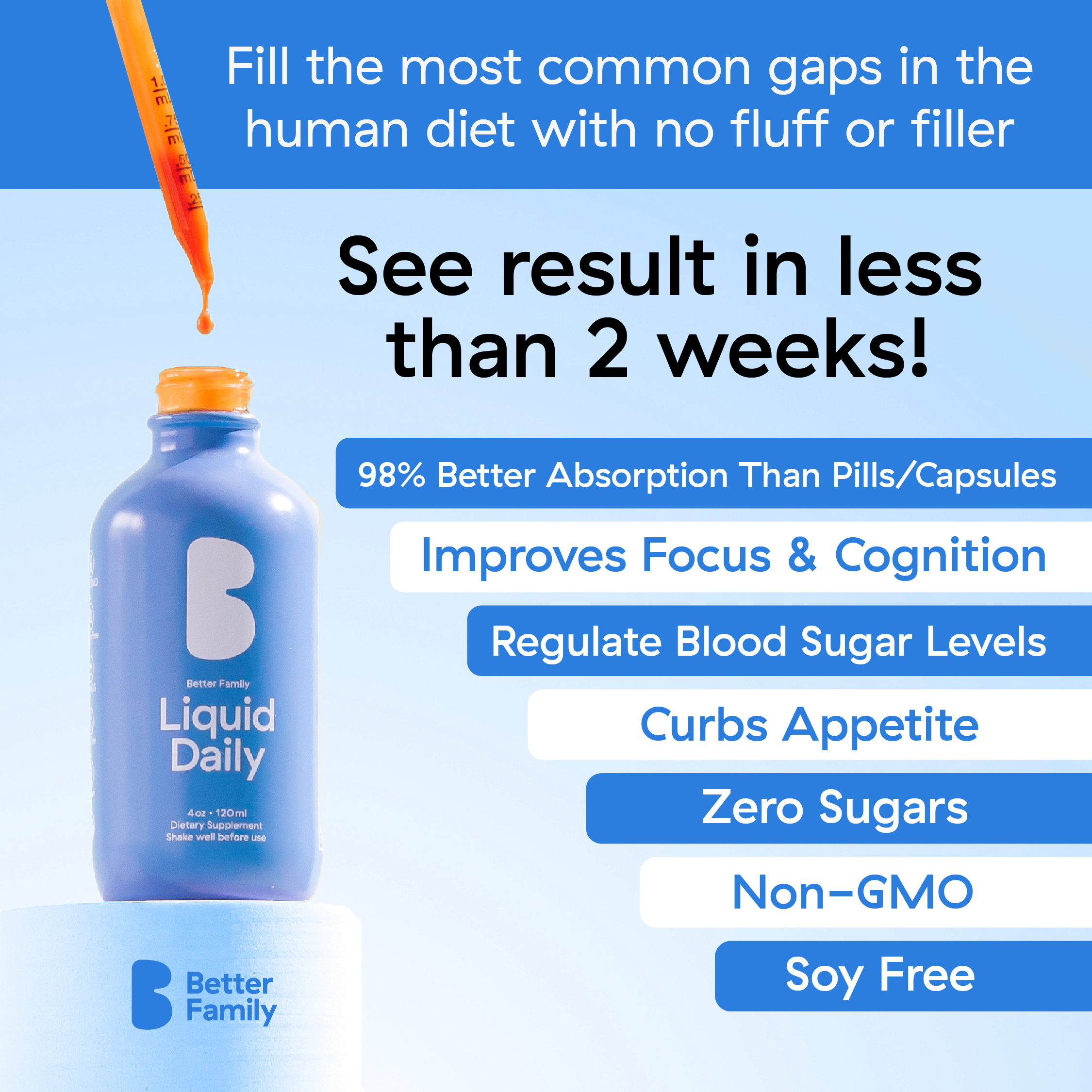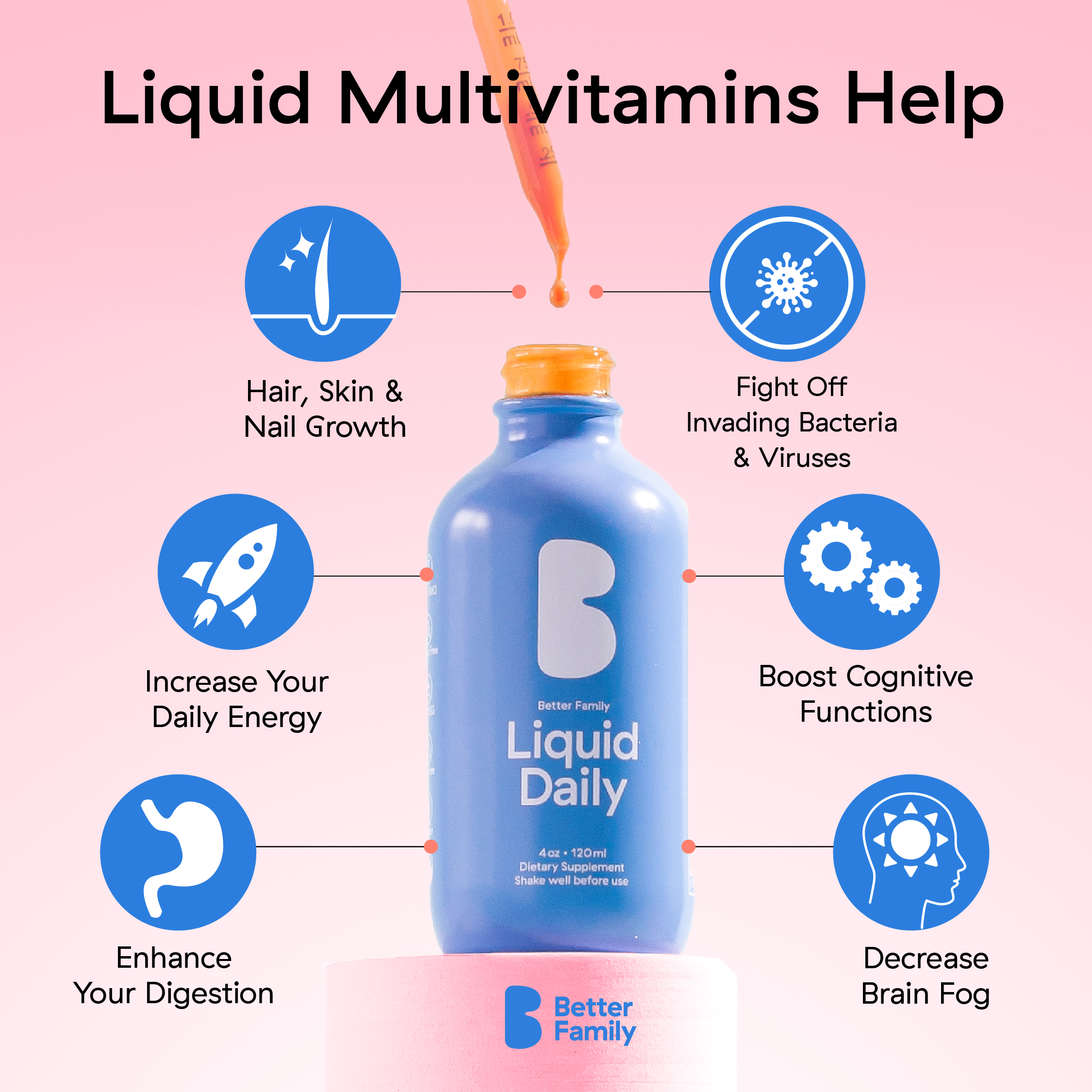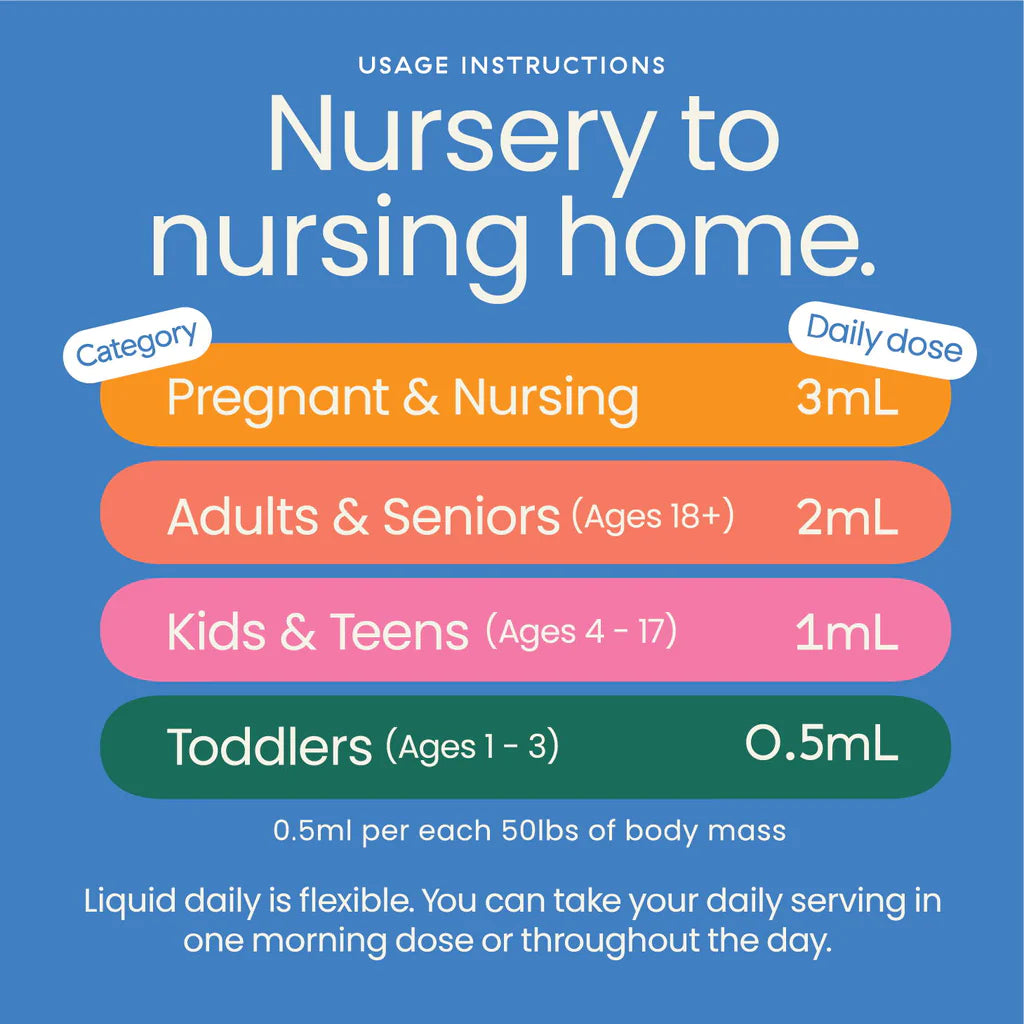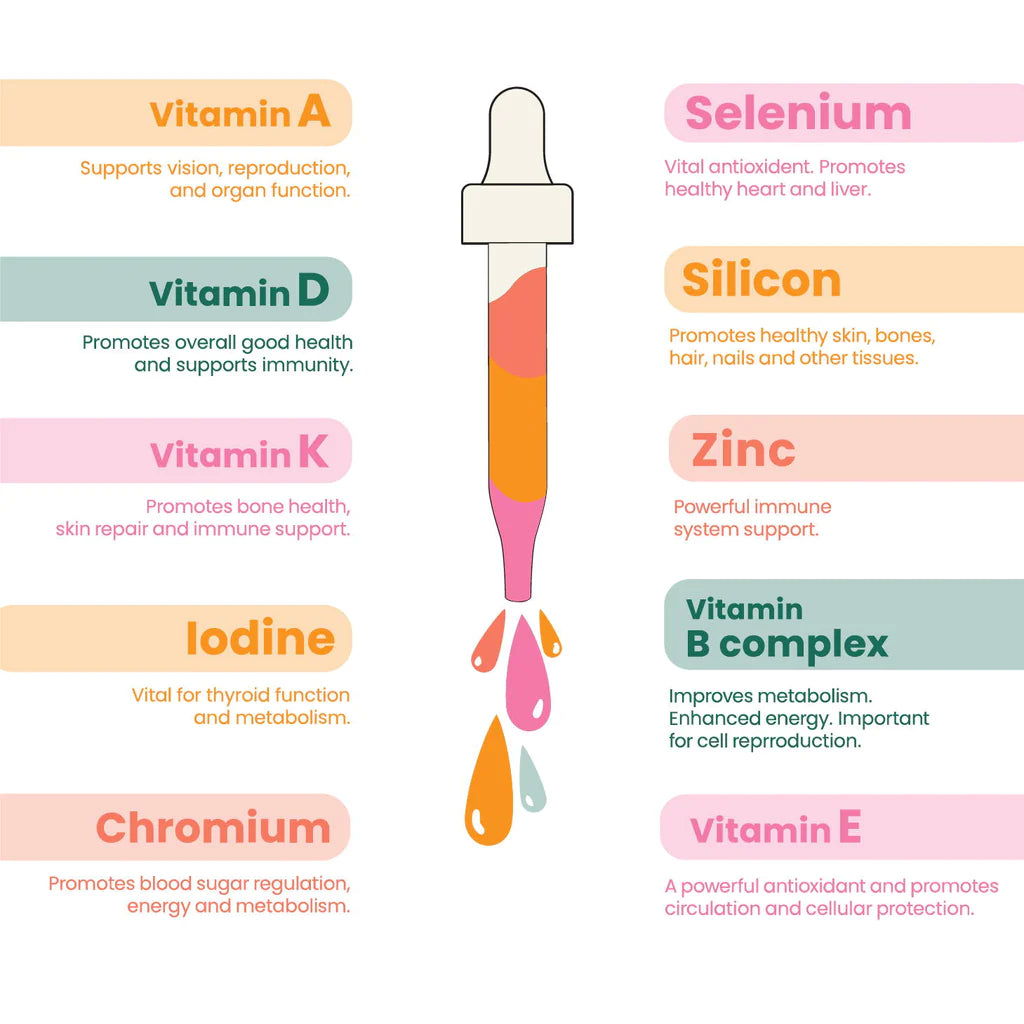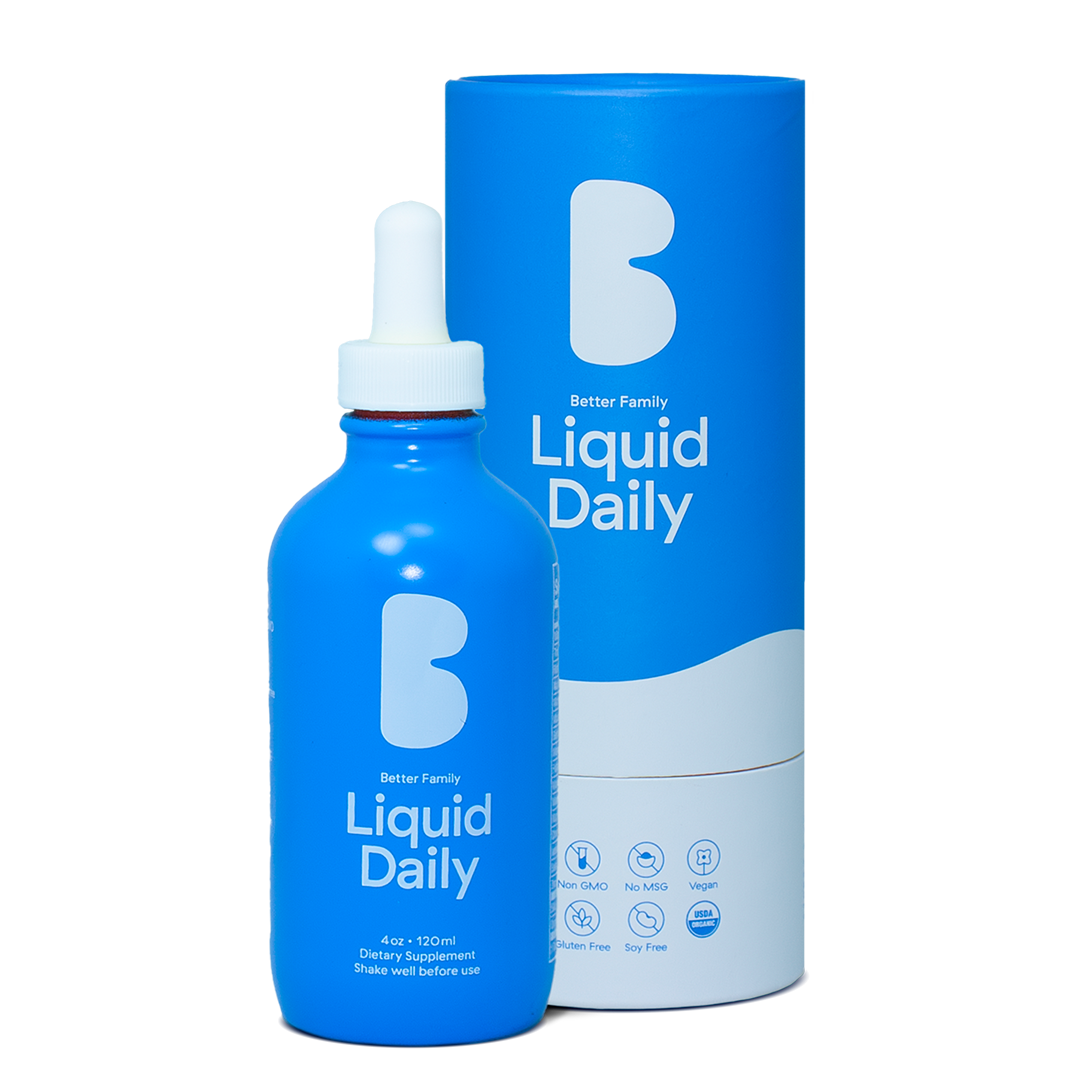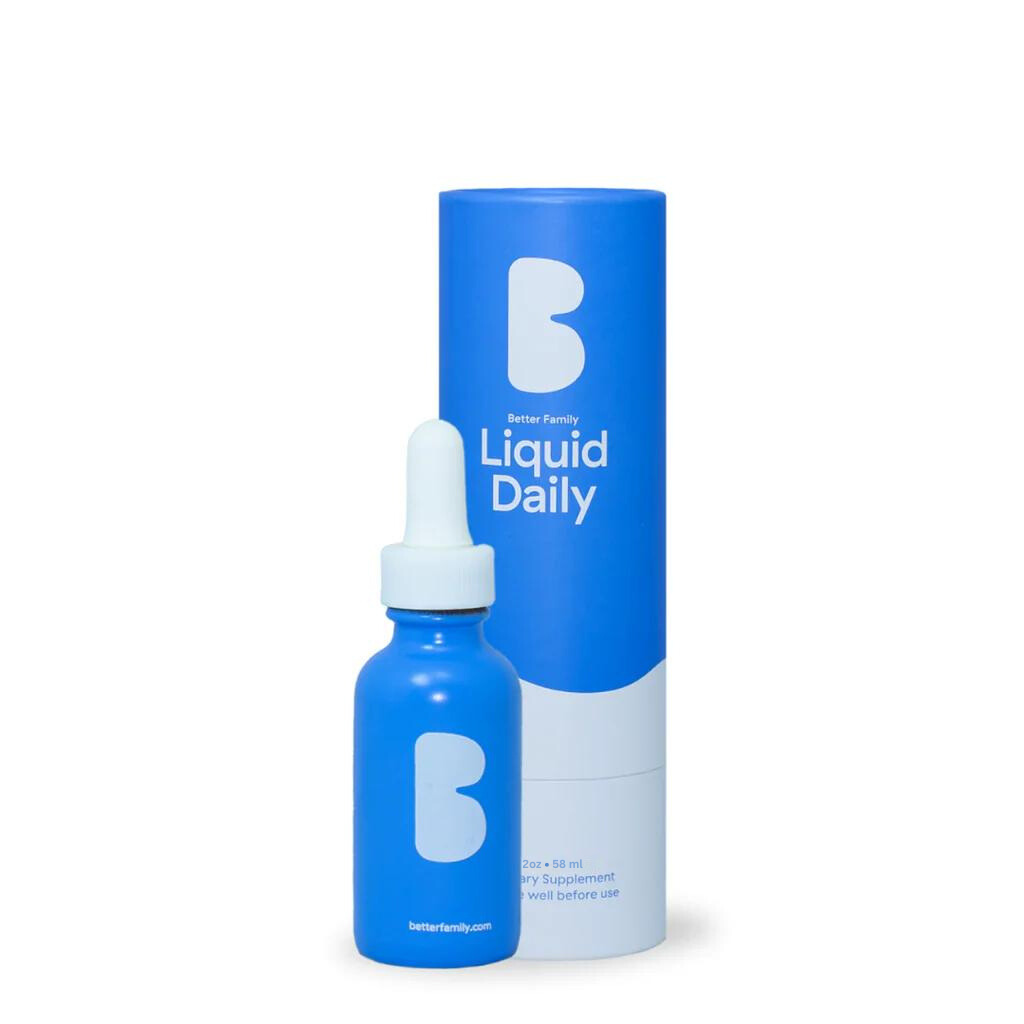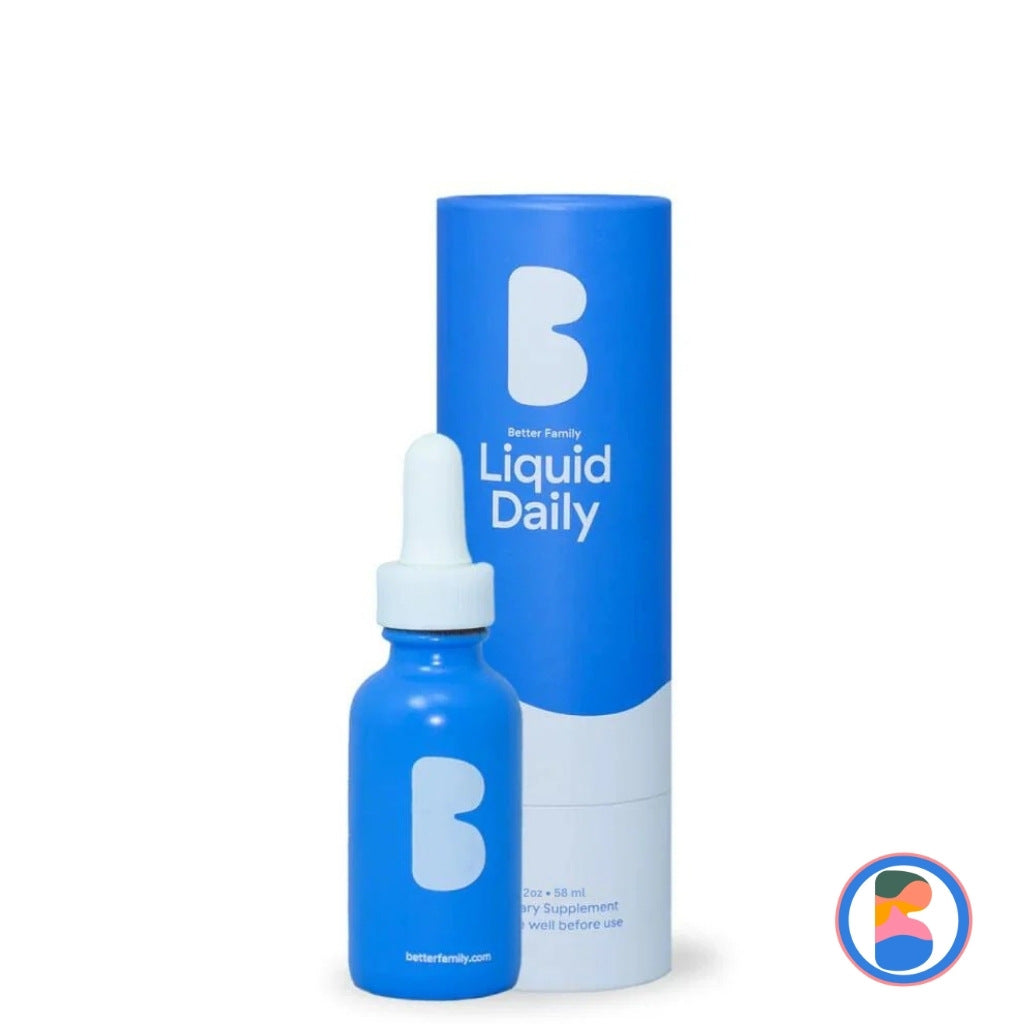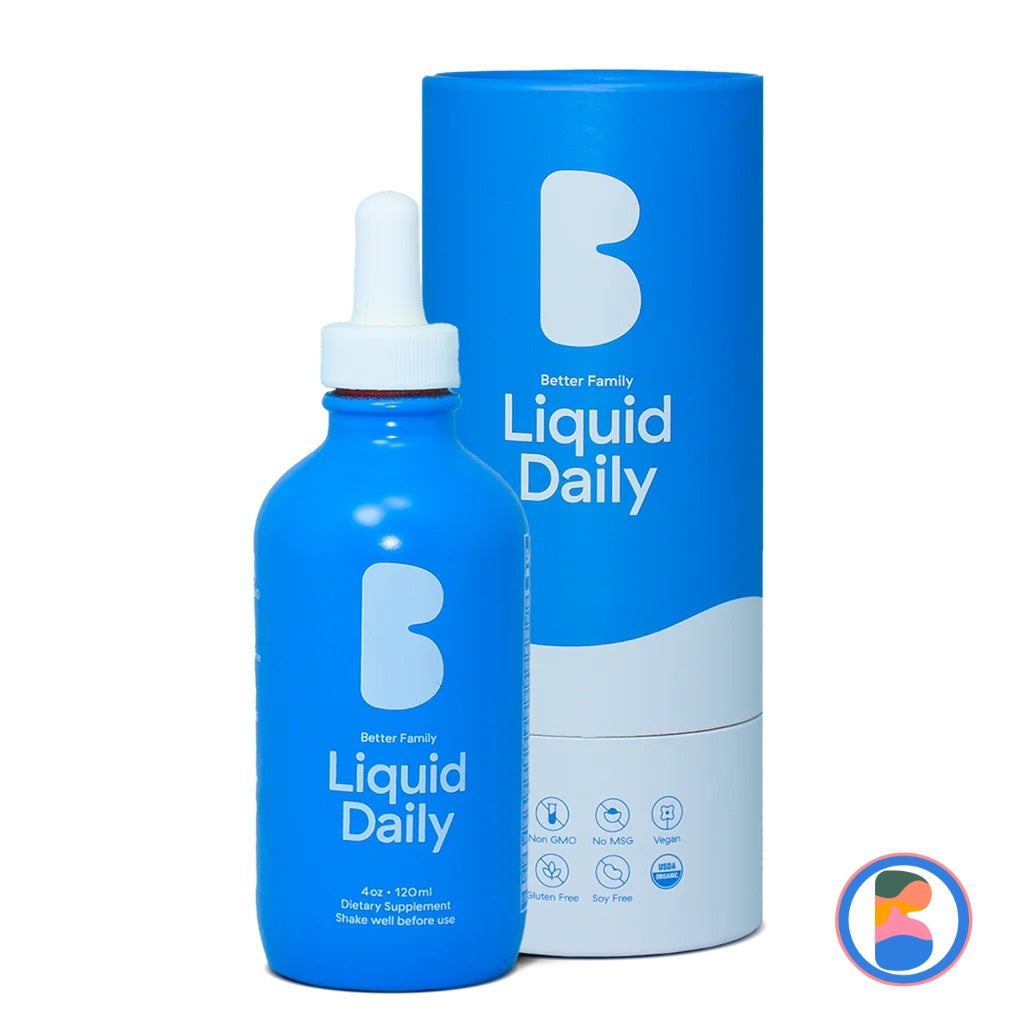Better Family Article Series
Liquid Multivitamins
The Absorption Advantage
This article series is brought to you by the team behind Liquid Daily: the better option for filling nutritional gaps in your household.
Liquid Is Better
Simplify Your Routine
You're In Control

Article Highlights
- A lack of sunlight, less exercise, and an increased risk of contracting an illness are all great reasons to ensure that your body is receiving the recommended daily amount of essential vitamins and minerals.
- Since most people obtain all the vitamin D they need from exposure to sunlight, people may be more prone to vitamin D deficiencies during winter months.
- Numerous vitamins are necessary to support healthy, functioning immune systems – vitamin A, vitamin C, vitamin D, and B vitamins.
Vitamin C During Winter
It’s no great secret that, during the winter months in the Northern Hemisphere, many people struggle with fewer hours of sunlight and less consistent or reliable access to fresh fruits and vegetables, as well as the cold temperatures and formidable wintery conditions. Even for people who enjoy winter weather, the early sunsets and increased risk of exposure to airborne illnesses can make the winter months challenging. However, human beings are not completely powerless in the battle against the bitter elements and scarce sources of essential vitamins and minerals. For instance, taking vitamin C during winter months can help boost the immune system (thereby making your body less susceptible to viral infections and other illnesses). And many other essential vitamins and minerals can provide health benefits during the wintertime.
Vitamin C doesn't just provide dietary benefits – applying vitamin C topically, as an ingredient of a skincare lotion or salve, can help support the production of elastin and collagen, which can help the skin remain firm and supple. This is especially helpful in the winter months when the air is dryer and increased hand washing may exacerbate dry skin on hands and wrists. Many skincare products tout the inclusion of vitamin C as a way to diminish signs of aging and maintain youthful, flawless skin.
For people with other questions like “Is vitamin C good for skin in winter months?” – the answer may surprise you. Taking vitamin C in winter can help reduce the severity of colds by supporting your body’s immune system. And foods rich in vitamin C like cranberries and citrus fruits can also be great sources of antioxidants. And we know also that vitamin C provides support for healthy skin as well, which is another important thing to consider when cold, winter conditions can be so hard on human skin.
"I started all 3 of my boys and myself on the Liquid Daily vitamins. It’s such a simple and efficient way to help ensure their development and keep us healthy. Great product!"
- Josh L.
Start feeling better with Liquid Daily - the liquid multivitamin packed with 18 essential nutrients & vitamins.
TRY LIQUID DAILYBest Vitamins for Cold Season
There are countless products on the market that are sold as supplements to prevent cold and flu symptoms, and it’s true that some essential vitamins and minerals can provide support to your immune system, but there’s little-to-no conclusive evidence that vitamin supplement products can effectively prevent colds. That doesn’t mean that they can’t be helpful, however.
Some vitamins for winter fatigue include vitamin A, vitamin C, vitamin D, and the family of B vitamins. In addition to helping support anti-inflammatory health in the body, vitamin A is also a vital component for the health and functioning of mucus membranes of the eyes and the skin. Vitamin C supports healthy immune system functioning and the repair of bodily tissue. Vitamin D helps the body absorb calcium more effectively which supports bone growth and cellular replenishment. And B vitamins are vital throughout the winter because they support the production of necessary neurotransmitters like serotonin.
The best vitamins for cold season are vitamin C for its ability to fortify your body’s immune system, vitamin E to help support skin health, and the family of B vitamins for their numerous health benefits. And healthcare professionals and nutritionists alike generally agree that the best way to obtain the daily recommended amount of essential vitamins and minerals is by way of a diverse and healthy diet. However, access to fresh produce and other fresh ingredients is usually more difficult to obtain during winter. Due to winter weather conditions, grocery stores may not carry as much in stock, and the quality of produce may not be as good as it is during the spring and summer. Because of this, vitamin and mineral supplements can provide a great way to ensure that your body has access to the fuel it needs to make it through another winter.
Best Vitamins for Immune System
Some of the best vitamins for immune system support are basically the same ones we’ve already mentioned a few times. Vitamin A supports ocular health and helps boost important immune-system cells' activities. Vitamin C is an invaluable component in the production and repair of soft tissues all over the body in addition to supporting immune system health by stimulating white blood cell activity.
However, the best vitamins to take when sick largely depend upon the type of illness. Some vitamin and mineral supplement products can even interact with or lessen the effectiveness of other medications, so be sure to check with your doctor or primary care physician about which vitamins you should be taking to support your immune system that won't compromise your other medicines.
If you are normally able to get enough sunlight from spring until autumn, you might consider taking a vitamin D supplement only during the wintertime to ensure your body still receives the daily recommended amount. And taking vitamin C supplements throughout influenza season can help reduce the severity of any illnesses you may contract. Each vitamin plays a special role in supporting your body’s health and the health and functionality of your immune system.
Try Liquid Daily
Liquid Daily is the all-in-one liquid multivitamin that contains the highest quality formats of the most important vitamins and minerals.
- 18 Essential Vitamins & Minerals
- Advanced Liquid Absorption
- Zero sugars, fillers, or artificial flavorings
- Safe & Effective for Kids & Adults!
Which Vitamins Do We Lack in Winter?
What vitamin do we lack in winter? Is there one in particular or are there multiple that people should take extra care to obtain throughout the colder months? If you are one of the many people wondering, “Which vitamin should I take in winter?” Don’t worry – you are not alone. Firstly, be sure to direct any questions you have about vitamin supplements to your pharmacist or your doctor; if you have a health condition that makes it difficult to absorb vitamins traditionally through a well-balanced diet, or if you suspect you may be prone to a particular vitamin deficiency, be sure to seek consultation from a qualified healthcare professional.
Many people may experience vitamin D deficiency during winter due to fewer hours of sunlight and cloudier conditions. Vitamin D deficiency symptoms include fatigue, difficulty sleeping, excessive pains or aches, prolonged sadness or depression, muscular weakness, decreased appetite, and even hair loss or pale skin. A simple blood test can identify whether or not your body is suffering from a vitamin D deficiency, and your primary care physician can likely identify several vitamin D-rich foods for you to try including in your diet more regularly or potentially some vitamin D supplement products as well. Common food sources of vitamin D are fatty fish like mackerel, salmon, trout, and tuna, but you can also find vitamin D in tinned fish, beef liver, fish liver, and egg yolks.
As far as vitamin D supplement products available – there are numerous options on the market including vitamin D pills, tablets, chewables, liquid vitamin D and gummies. If you or someone in your family isn’t getting enough sunlight due to staying indoors to avoid the cold, vitamin D supplements might be a good solution for a situation like that.
Best Vitamins to Stay Healthy
While all essential vitamins support healthy bodily functions, it’s important to understand their differences, unique purposes, and general benefits. Some less-than-reputable health and wellness blogs might have you believe that vitamins are the ultimate solution to maintaining a happy and healthy body, which simply isn’t the case.
It’s true that vitamins are important and support critical bodily functions, but they needn’t be taken in excess of the recommended daily amounts. In fact, some vitamins taken in excess can be toxic and cause additional health problems. For instance, vitamin D toxicity can cause a blood condition called hypercalcemia, which is when too much calcium builds up in the bloodstream. Symptoms of this condition include weakness, nausea, frequent urination, and vomiting. Left unchecked, vitamin D toxicity can also cause kidney problems and calcium stones.
If you are concerned and wondering, “How much vitamin C and zinc should I take for a cold?” It’s important to remember that vitamin C helps support your immune system and zinc is necessary for virtually every cellular function of which the human body is capable. According to functional nutritional therapy practitioner Tansy Rogers, “Zinc plays a role in protein and carbohydrate metabolism, cell division and growth, skin health, is vital for the immune health and its functioning and is also a key component in gut health”.
The best supplements to take for overall health will differ for everyone. There are so many variables and contributing factors to a person’s health that it’s impractical to prescribe the same solution for every individual. Our diets, our medical history, our family’s medical history, our job, our daily environment – everyone is going to have a different circumstance that calls for its own unique approach. Check with your primary care physician if you have questions about your personal health needs and to find out what steps you can take to ensure your body receives all the essential vitamins and minerals it needs.
"The vitamins are tasty and the # of essential vitamins all in one liquid is fabulous!"
- Kevin M.
Try the lightly and naturally flavored liquid multivitamin - the perfect blend of essential nutrients, including methylfolate.
TRY LIQUID DAILYMore articles from Better Family


